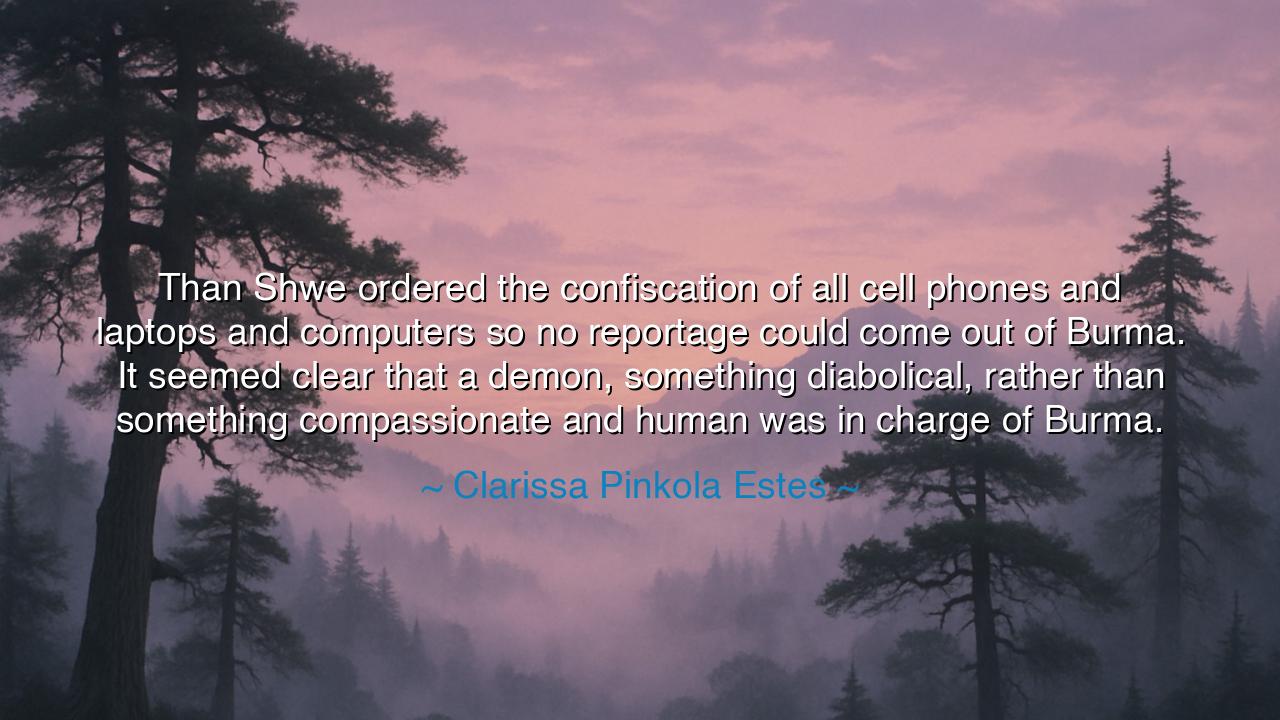
Than Shwe ordered the confiscation of all cell phones and laptops
Than Shwe ordered the confiscation of all cell phones and laptops and computers so no reportage could come out of Burma. It seemed clear that a demon, something diabolical, rather than something compassionate and human was in charge of Burma.






"Than Shwe ordered the confiscation of all cell phones and laptops and computers so no reportage could come out of Burma. It seemed clear that a demon, something diabolical, rather than something compassionate and human was in charge of Burma." These words by Clarissa Pinkola Estes speak to the darkness that often arises when power is unchecked, and the human spirit is silenced by those who seek to control not just the bodies of people, but their very ability to speak and be heard. The confiscation of tools meant for communication—cell phones, laptops, and computers—was an act not only of political suppression, but of spiritual oppression, aimed at cutting off the world’s connection to the truth of what was happening within the borders of Burma. Estes draws a powerful parallel: the figure in charge, Than Shwe, is not a mere authoritarian leader, but a demon—a force of fear and darkness, intent on extinguishing the light of human connection and compassion.
In the ancient world, the struggle for freedom of expression was one of the central themes of great philosophical discourse. The Greeks, with their democratic ideals, valued the right of every citizen to speak freely in the agora, the marketplace of ideas. Socrates famously argued that the pursuit of truth required the free exchange of ideas, even if those ideas were uncomfortable or challenging. But throughout history, there have been those who, like Than Shwe, sought to silence this exchange—either through the brutal suppression of speech or by systematically controlling the flow of information. The use of fear and force to control communication is not a new tactic, but one as old as civilization itself.
In the story of the Roman Empire, we see another example of how those in power sought to control not just the bodies of people, but the flow of information. The Emperor Augustus knew that in order to maintain his power, he must control the stories that were told about him and his empire. He established the censorship of speech, ensuring that only the messages that served his political interests could be heard. This was a form of spiritual oppression, where the people were not allowed to speak their truth, and the propaganda of the ruling class became the only voice that could be heard. Just as in Burma under Than Shwe, the voices of the people were drowned out by the fear and power of the ruling authority, creating an atmosphere where even the truth was a dangerous thing.
Clarissa Pinkola Estes’ words echo the spirit of freedom that has always been at the heart of the human struggle. In a world where those in power control the flow of information, where the voices of the oppressed are silenced, it becomes clear that the human spirit is under assault. Estes uses the image of a demon to illustrate the evil that takes hold when power is used to suppress the truth and stifle compassion. The act of confiscating phones, laptops, and computers is not just an attempt to control information; it is an attempt to sever the connection between the soul of the people and the outside world. When people are no longer allowed to share their experiences, their pain, or their resistance, they are reduced to nothing—their humanity erased by the darkness of those in charge.
In modern times, we see similar oppressions in places where the freedom of speech is compromised. The rise of authoritarian regimes around the world continues to suppress not just the physical freedoms of their people, but their ability to communicate. In China, for example, the government has cracked down on the use of social media and online platforms, blocking access to the outside world and controlling the flow of information. In these places, the spirit of the people is also stifled, their voices and their struggles hidden from the world. This is the very demon that Estes describes: the force that seeks to control, to oppress, and to erase human connection.
The lesson here is one of resilience and resistance. Just as Socrates chose to speak truth even when it led to his death, so must we continue to speak out against injustice and oppression. We must honor the voices of those who are silenced, knowing that their truth still resonates, even when it cannot be heard. The tools of communication—whether they are cell phones, computers, or simple words—are the means by which we express our humanity. If those tools are taken from us, we must find new ways to share our stories, to connect with one another, and to continue the fight for truth and freedom. The spirit of the human soul is not bound by any machine or any regime; it can never be silenced, as long as there are those willing to stand and speak.
In practical terms, this means that we must never take the freedom of expression for granted. We must continue to fight for the right to speak, to share, and to express our truths. Whether through technology or in person, we must honor the stories of the oppressed and marginalized, making sure their voices are not erased, even in the face of those who would use power to silence them. Let us remember that, as long as we have the power to speak and connect, we have the power to resist the demons of oppression and to remind the world of the enduring power of the human spirit.






AAdministratorAdministrator
Welcome, honored guests. Please leave a comment, we will respond soon